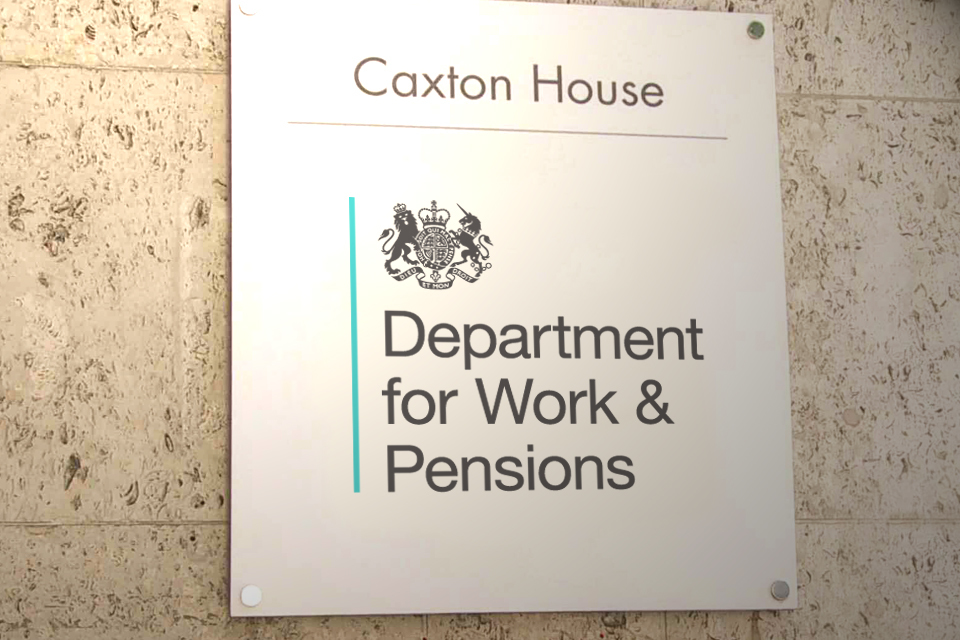The department updates policies to include explicit reference to use of automated tools in decision making – but indicates that humans always have final say if benefit applications are denied
The Department for Work and Pensions has amended its personal data policies to provide – a small amount of – extra detail concerning its use of automated systems in supporting decision-making, while removing references to citizens’ right of appeal.
The DWP recently updated its online personal information charter – a department-wide document, also known as the privacy policy, that sets out publicly the rules and practices that represent “how and why we use your personal information and your rights and responsibilities”.
The latest changes to the guidance are entirely contained within the section headed ‘Automated decision making’, which has been completely rewritten.
Unlike the previous version, the updated section explicitly states that the department does make use of “automated processing in some decision making” and provides for the possibility that some decisions could be made entirely via automation – where “the law allows this”. The changes also include the removal of references to “meaningful input from staff” and “review or appeal options” for benefit claimants.
Related content
- DWP looks to improve SEO and online content to support Universal Credit switchover
- DWP signs £100k deal to ensure accessibility of Universal Credit digital services
- DWP brings in digital support for Universal Credit programme in £5m deal
The updated version reads: “DWP uses automated processing in some decision making to help us deliver efficient services. DWP will not make any decision based solely on automated processing which has a significant effect on you unless the law allows this. You have rights relating to this type of decision. We will tell you more about this if we make any such decision.”
The previous version read: “Most of the decisions DWP makes that have a substantial effect on you – for example whether or not you are entitled to a benefit – are made with meaningful input from staff. Review or appeal options are built in to all DWP benefit processes, even where this is not specifically required by data protection laws. DWP is developing new digital services all the time. If any new services involve automated decision-making, we will tell you about this when the decision is made.”
The DWP declined to comment for this story, but indicated that individuals retain exactly the same rights of review and appeal for all its services and decision – despite the removal of the explicit reference to these rights in the charter.
The department also pointed PublicTechnology towards an unchanged section of the
policy that states: “DWP does not use AI to replace human judgement to determine or deny a payment to a claimant. A final decision in these circumstances always involves a human agent.”
The DWP has faced criticism for its deployment of algorithms in helping to detect fraud in claims for Universal Credit advances. Civil society groups such as the Public Law Project have raised concerns about the potential for bias, claiming there is currently a “lack of a transparency and accountability” in the department’s use of automation – which is set to be significantly increased in the coming years.
The DWP’s recently published accounts revealed plans to invest £70m between now and 2025 in expanding its use of algorithms and analytics to help tackle benefit fraud.





Fansly Leaks Mega Link
Jenise Hart OnlyFans Mega Link Download
Buy Leaked Content ( Visit https://archiver.fans )
Black Ass Jenny OnlyFans Mega Link Download
Lexi 2 Legit OnlyFans Mega Link Download
Rubi Rose OnlyFans Mega Link Download
Only Fans Leaks Mega Folders
Black Ass Jenny OnlyFans Mega Link Download
Ima Cri Baby OnlyFans Mega Link Download ( Visit https://archiver.fans )
Yasmine Lopez OnlyFans Mega Link Download ( Visit https://archiver.fans )
Lexi 2 Legit OnlyFans Mega Link Download
3TB Only Fans Mega
Taylor Hall OnlyFans Mega Link Download
Caaart OnlyFans Mega Link Download
Updated Only Fans Leaks ( Visit https://archiver.fans )
North Natt OnlyFans Mega Link Download
Yasmine Lopez OnlyFans Mega Link Download ( Visit https://archiver.fans )
벼룩시장 신문그대로보기 (구인구직, 부동산) 벼룩시장 신문그대로보기 바로가기 그리고 지역별 벼룩시장 종이신문그대로보기 방법 (구인구직, 부동산) 알아볼게요. 교차로신문 같이 벼룩시장은 지역별 일자리, 구인구직, 부동산 등 다양한 정보를 제공해요. 교차로신문그대로보기 바로가기는 아래에서 확인하고, 오늘은 벼룩시장 신문그대로보기 바로가기 그리고 사용법 섹스카지노사이트
Only Fans Leaks Free Download
Only Fans Leaks Updates
Corinna Kopf OnlyFans Mega Link Download ( Visit https://archiver.fans )
Yasmine Lopez OnlyFans Mega Link Download ( Visit https://archiver.fans )
여행지
Only Fans Leaks Mega Folders
Rebecca J OnlyFans Mega Link Download ( Visit https://archiver.fans )
Taylor Hall OnlyFans Mega Link Download
Only Fans Leaks Updates
Jenise Hart OnlyFans Mega Link Download
Crii Baby RiRi OnlyFans Mega Link Download ( Visit https://archiver.fans )
강남안마시술소중계업체
https://klero.tistory.com/tag/MBC20편성표20온에어20시청
안성출장마사지
충무로출장업소
weight loss plates portion control
Leah Mifsud OnlyFans Mega Link Download ( Visit https://archiver.fans )
Taylor Hall OnlyFans Mega Link Download
Caaart OnlyFans Mega Link Download
Rebecca J OnlyFans Mega Link Download ( Visit https://archiver.fans )
https://pornmaster.fun/hd/foreign-vi
Its Lunar Liv OnlyFans Mega Link Download
Only Fans Leaks Updates
GG With The WAP OnlyFans Mega Link Download
https://pornmaster.fun/hd/xxx-gandi-stories-comnuska-heroine-sexy-chudai-photo-pura
Rubi Rose OnlyFans Mega Link Download
Free Only Fans Leaks ( Visit https://archiver.fans )
Only Fans Leaks Updates
https://pornmaster.fun/hd/威奇托找援交妹【linetyp96】上门服务-sjr
Im xXx Dark OnlyFans Mega Link Download ( Visit https://archiver.fans )
https://pws1999.tistory.com/130
Yasmine Lopez OnlyFans Mega Link Download ( Visit https://archiver.fans )
Buy Only Fans Leaks ( Visit https://archiver.fans )
Caaart OnlyFans Mega Link Download
North Natt OnlyFans Mega Link Download
https://mrdeeply.tistory.com/441
8TB Only Fans Mega ( Visit https://archiver.fans )
Leah Mifsud OnlyFans Mega Link Download ( Visit https://archiver.fans )
이태원게이바
Im xXx Dark OnlyFans Mega Link Download ( Visit https://archiver.fans )
Mikaila Dancer OnlyFans Mega Link Download
Free Only Fans Leaks ( Visit https://archiver.fans )
https://itlearn.kr/
Its Lunar Liv OnlyFans Mega Link Download
Only Fans Leaks Free Download
Buy Only Fans Leaks ( Visit https://archiver.fans )
8TB Only Fans Mega ( Visit https://archiver.fans )
3TB Only Fans Mega
Mikaila Dancer OnlyFans Mega Link Download
벼룩시장 구인구직 및 신문 그대로 보기 (PC/모바일) | 구인구직 앱 어플 무료 설치 다운로드 | 모바일 벼룩시장 보는 방법 | 벼룩시장 부동산 | 지역별 벼룩시장 | 벼룩시장 종이신문 에 대해 알아보겠습니다. 섹스카지노사이트
충무로출장업소
Black Ass Jenny OnlyFans Mega Link Download
거제출장안마
GG With The WAP OnlyFans Mega Link Download
Only Fans Leaks Free Download
Can you be more specific about the content of your article? After reading it, I still have some doubts. Hope you can help me.
Corinna Kopf OnlyFans Mega Link Download ( Visit https://archiver.fans )
TheRealRebeccaJ OnlyFans Mega Link Download
Mega Link Store
TheRealRebeccaJ OnlyFans Mega Link Download
Black Ass Jenny OnlyFans Mega Link Download
Buy Leaked Only Fans ( Visit https://archiver.fans )
Corinna Kopf OnlyFans Mega Link Download ( Visit https://archiver.fans )
Mega Link Shop ( Visit https://archiver.fans )
Buy Leaked Only Fans ( Visit https://archiver.fans )
8TB Only Fans Mega ( Visit https://archiver.fans )
Buy Only Fans Leaks ( Visit https://archiver.fans )
Emmanuel Lustin OnlyFans Mega Link Download ( Visit https://archiver.fans )
Ima Cri Baby OnlyFans Mega Link Download ( Visit https://archiver.fans )
https://itgunza.com/182
Mega Link Store
Buy Fansly Leaks ( Visit https://archiver.fans )
Itz Grippy TV OnlyFans Mega Link Download ( Visit https://archiver.fans )
Mulan Hernandez OnlyFans Mega Link Download ( Visit https://archiver.fans )
Free Only Fans Leaks ( Visit https://archiver.fans )
https://honeytiplabs.com/크롬-다크모드-설정-네이버-어두운-화면-설정-방법/
Daalischus Rose OnlyFans Mega Link Download
TheRealRebeccaJ OnlyFans Mega Link Download
Rubi Rose OnlyFans Mega Link Download
Only Fans Leaks Free Download
Genesis Mia Lopez OnlyFans Mega Link Download
강남콜걸
https://ddnews.co.kr/category/welfare/baby/
청도페이스라인출장
Bulma XO OnlyFans Mega Link Download
Barely Legal Lexi OnlyFans Mega Link Download
Leah Mifsud OnlyFans Mega Link Download ( Visit https://archiver.fans )
Taylor Hall OnlyFans Mega Link Download
Lexi 2 Legit OnlyFans Mega Link Download
Leah Mifsud OnlyFans Mega Link Download ( Visit https://archiver.fans )
https://nicesongtoyou.com/today-fortune/horoscope-by-zodiac/
안성출장마사지
Its Lunar Liv OnlyFans Mega Link Download
하동동해출장만남 소자본 창업
https://sportscom.co.kr/location-tracking/
https://chotiple.tistory.com/tag/부동산20매물20조회
TheRealRebeccaJ OnlyFans Mega Link Download
Gina WAP OnlyFans Mega Link Download ( Visit https://archiver.fans )
Rubi Rose OnlyFans Mega Link Download
Crii Baby RiRi OnlyFans Mega Link Download ( Visit https://archiver.fans )
https://dnolife.net/software/smemo/
https://oculus-vr.co.kr/hwang-hee-chan-wolverhampton/
Leah Mifsud OnlyFans Mega Link Download ( Visit https://archiver.fans )
TheRealRebeccaJ OnlyFans Mega Link Download
SazonDePuertoRicoINC OnlyFans Leaks Mega Folder Link Download
GinaWAP Only Fans Leaks ( https://urbancrocspot.org/gina-wap-gg-with-the-wap-only-fans-mega-link-9gb/ )
The Real Bombshell Mint Only Fans Leaks ( https://UrbanCrocSpot.org/ )
Lena Paul Lena is a Peach OnlyFans Leaks Mega Folder Link Download
BombshellMint ( https://UrbanCrocSpot.org/shop )
GGWithTheWAP Only Fans PPVs ( https://urbancrocspot.org/gina-wap-gg-with-the-wap-only-fans-mega-link-9gb/ )
GGWithTheWAP Only Fans PPVs ( https://urbancrocspot.org/gina-wap-gg-with-the-wap-only-fans-mega-link-9gb/ )
Mandy Lee OnlyFans Leaks Mega Folder Link Download
Bombshell Mint Nude Leaks ( https://CrocSpot.Fun )
RiahBear18 OnlyFans Leaks Mega Folder Link Download ( https://Archiver.Fans )
https://itmoney4you.com/신한생명-무료운세-토정비결-보는방법/
The Real Bombshell Mint Only Fans Leaks ( https://UrbanCrocSpot.org/ )
GGWithTheWAP Mega Folder Download ( https://urbancrocspot.org/gina-wap-gg-with-the-wap-only-fans-mega-link-9gb/ )
Tamekia OnlyFans Leaks Mega Folder Link Download ( https://UrbanCrocSpot.org )
GinaWAP Only Fans Leaks ( https://urbancrocspot.org/gina-wap-gg-with-the-wap-only-fans-mega-link-9gb/ )
The Real Bombshell Mint Only Fans Leaks ( https://UrbanCrocSpot.org/ )
Codename Jas OnlyFans Leaks Mega Folder Link Download
https://dday.tistory.com/325
Fantastic insights! The advice about avoiding lifestyle inflation is perfect. I’ve been using this strategy, and it’s helped my finances in order. I also wrote a guide on how to avoid it, which might help your readers. Keep up the great work!
https://infohelpforyou.com/
https://madreviewer.tistory.com/tag/쿠팡20판매자20하는20법
Buy Drugs
Buy Drugs
https://download-install.com/entry/유튜브-밴스드-YouTube-Vanced
https://dnolife.net/software/twitch/
https://mrdeeply.tistory.com/91
Thanks for the ideas you have shared here. In addition, I believe there are numerous factors that keep your car insurance premium all the way down. One is, to contemplate buying automobiles that are within the good listing of car insurance businesses. Cars that happen to be expensive are more at risk of being snatched. Aside from that insurance policies are also based on the value of the car, so the more expensive it is, then the higher your premium you have to pay.
강남안마시술소중계업체
One thing I’ve noticed is there are plenty of myths regarding the banks intentions whenever talking about foreclosed. One fable in particular is the fact that the bank desires your house. The bank wants your dollars, not the house. They want the money they lent you together with interest. Preventing the bank is only going to draw a foreclosed realization. Thanks for your post.
Would you be enthusiastic about exchanging hyperlinks?
Appreciate it for this rattling post, I am glad I noticed this website on yahoo.
수원출장샵